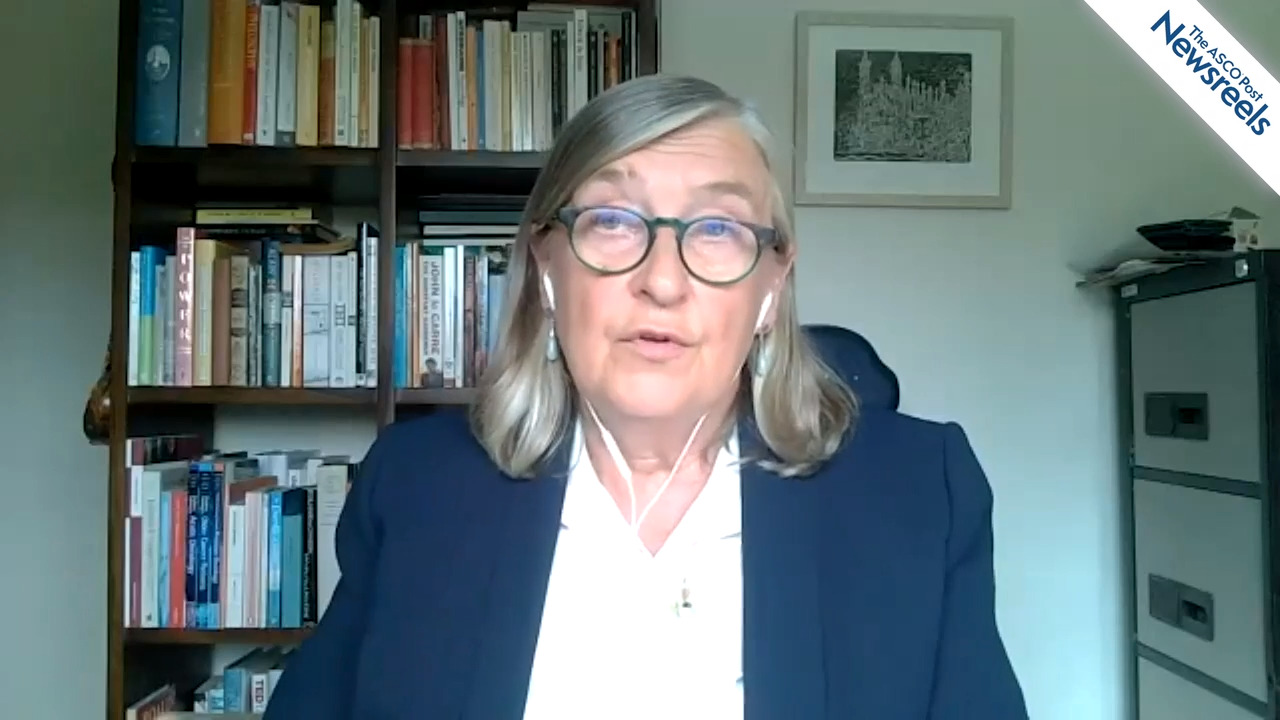Hope S. Rugo, MD, on Triple-Negative Breast Cancer: Treatment Findings From KEYNOTE-355 on Pembrolizumab and Chemotherapy
Hope S. Rugo, MD, of the University of California, San Francisco, discusses phase III results from the KEYNOTE-355 study of pembrolizumab plus chemotherapy, which improved overall survival vs chemotherapy alone in patients with previously untreated locally recurrent, inoperable, or metastatic triple-negative breast cancer whose tumors expressed PD-L1 (Abstract LBA16).
Another Antibody-Drug Conjugate Enters the Metastatic Breast Cancer Landscape
In the global phase III TULIP trial in metastatic HER2-positive breast cancer, treatment with the antibody-drug conjugate vic-trastuzumab duocarmazine (SYD985) significantly improved progression-free survival in comparison with standard chemotherapy in previously treated patients, making this a new ...
MONALEESA-2: Overall Survival Benefit With First-Line Ribociclib Plus Letrozole
Ribociclib plus hormonal therapy in the first-line setting boosted overall survival by more than 1 year, vs hormone therapy alone, in postmenopausal women with hormone receptor–positive HER2-negative advanced breast cancer, according to the latest findings from the MONALEESA-2 trial, reported at...
Development of a Breast Cancer Risk Prediction Model for Black Women in the United States
As reported in the Journal of Clinical Oncology, Julie R. Palmer, ScD, and colleagues have developed and validated a risk prediction model for invasive breast cancer in Black women in the United States. Study Details For the development of the model, breast cancer relative and attributable risks...
Preclinical Study Examines Relationship Between Aging Breast Tissue and Invasive Breast Cancer
Breast cancer risk increases with age, but while scientists have long studied cellular changes that take place in the body over time, a new study published by Bahcecioglu et al in Advanced Science examined how the extracellular matrix—an underlying network of molecules and proteins that provide the ...
First-Line Fulvestrant/Palbociclib vs Letrozole/Palbociclib for Endocrine-Sensitive, HR-Positive, HER2-Negative Advanced Breast Cancer
In the phase II PARSIFAL trial reported in JAMA Oncology, Antonio Llombart-Cussac, MD, and colleagues found that the combination of fulvestrant plus palbociclib did not improve progression-free survival vs letrozole plus palbociclib in women with advanced endocrine-sensitive, hormone receptor...
Global Analysis of National Health System Characteristics and Breast Cancer Mortality and Stage at Diagnosis
In a global population-based study reported in The Lancet Oncology, Duggan et al identified national health system characteristics associated with reduced breast cancer mortality, including higher Universal Health Coverage Service Coverage Index (UHC Index) rating and increased number of public...
Nodal Recurrence With Sentinel Node Biopsy Alone Following Neoadjuvant Chemotherapy for Node-Positive Breast Cancer
In a single-center cohort study reported in JAMA Oncology, Barrio et al evaluated nodal recurrence rates in patients with clinically node-negative breast cancer following neoadjuvant chemotherapy for biopsy-proven node-positive disease. The investigators found an extremely low incidence of nodal...
Is Baseline Brain White Matter Microstructure Associated With Cognitive Decline After Chemotherapy for Breast Cancer?
In a Dutch study reported in the Journal of Clinical Oncology, de Ruiter et al found that white matter microstructure at baseline was associated with cognitive decline after chemotherapy for breast cancer. Study Details The study included 49 patients with breast cancer who received...
FDA Approves Abemaciclib in Combination With Endocrine Therapy for Early Breast Cancer
On October 12, the U.S. Food and Drug Administration (FDA) approved abemaciclib (Verzenio) in combination with endocrine therapy (tamoxifen or an aromatase inhibitor) for the adjuvant treatment of adult patients with hormone receptor (HR)-positive, HER2-negative, node-positive early breast cancer...
Recent FDA Approvals in Breast Cancer
In the past year, the U.S. Food and Drug Administration (FDA) approved five treatment options for patients with breast cancer, which are summarized herein. Abemaciclib Combination On October 12, 2021, the FDA approved abemaciclib (Verzenio) with endocrine therapy (tamoxifen or an aromatase...
KEYNOTE-355: Pembrolizumab Plus Chemotherapy Improves Progression-Free Survival in PD-L1–Enriched Advanced Triple-Negative Breast Cancer
Pembrolizumab plus chemotherapy improved progression-free survival vs chemotherapy alone as first-line treatment of advanced or metastatic triple-negative breast cancer, according to the results of KEYNOTE-355.1 Progression-free survival was significantly improved with pembrolizumab plus...
EA1131 Trial: Platinum Not Equal to Capecitabine for Residual Disease in Triple-Negative Breast Cancer
In patients with triple-negative breast cancer who have residual disease after neoadjuvant chemotherapy, adjuvant capecitabine remains the standard of care. In the multicenter randomized noninferiority EA1131 trial, which included primarily basal tumors, noninferiority of adjuvant platinum over...
Sacituzumab Govitecan-hziy Improves Survival vs Single-Agent Chemotherapy in Metastatic Triple-Negative Breast Cancer
As reported in The New England Journal of Medicine by Aditya Bardia, MD, of the Division of Medical Oncology, Massachusetts General Hospital Cancer Center, and colleagues, the phase III ASCENT trial has shown prolonged progression-free and overall survival with the Trop-2–directed antibody-drug...
Neoadjuvant Durvalumab Improves Long-Term Outcomes in the GeparNuevo Trial
In the phase II GeparNuevo trial, patients with early triple-negative breast cancer receiving the PD-L1 inhibitor durvalumab in addition to chemotherapy as neoadjuvant therapy saw improvements in long-term outcomes. The results were presented at the 2021 ASCO Annual Meeting by Sibylle Loibl, MD,...
KEYNOTE-522: Neoadjuvant Pembrolizumab Improves Event-Free Survival in Triple-Negative Breast Cancer
The latest analysis of the phase III KEYNOTE-522 trial demonstrated significant improvements in clinical outcomes with pembrolizumab plus chemotherapy vs chemotherapy alone as a neoadjuvant/adjuvant treatment of triple-negative breast cancer.1 This is the first large, randomized, phase III trial to ...
Early Triple-Negative Breast Cancer: Are Checkpoint Inhibitors Ready for Neoadjuvant or Adjuvant Use?
Recent clinical trials have been encouraging for the neoadjuvant or adjuvant use of immune checkpoint inhibitors in triple-negative breast cancer, but is this approach ready for the clinic? This question was addressed at the 38th Miami Breast Cancer Conference, held virtually this year, by Adam M....
Margetuximab-cmkb Plus Chemotherapy Prolongs Progression-Free Survival in Heavily Pretreated HER2 Positive Breast Cancer
As reported in JAMA Oncology by Hope S. Rugo, MD, of the University of California San Francisco Helen Diller Family Comprehensive Cancer Center, and colleagues, the phase III SOPHIA trial has shown significantly prolonged progression-free survival with margetuximab-cmkb plus chemotherapy vs...
ADAPT Trial: ‘Excellent’ Outcomes Reported With Neoadjuvant Dual HER2 Therapy in Breast Cancer
The first overall survival analysis of the WGS-ADAPT HER2+/HR– study, which evaluated neoadjuvant therapy in patients with hormone receptor–negative, HER2-positive disease, showed that treatment with pertuzumab and trastuzumab plus paclitaxel—or with the chemotherapy-free regimen of...
Long-Term Analysis of Short-HER Trial of Adjuvant Trastuzumab
Long-term analysis of the Short-HER trial showed that 9 weeks of adjuvant trastuzumab conveyed benefits comparable to a 1-year course in patients with early HER2-positive breast cancer deemed to be at low or intermediate risk for recurrence. High-risk patients, however, derived considerably more...
Novel HER2-Targeted Therapies Pose Sequencing Challenges
With three new HER2-targeted therapies approved over the past year or two alone, the treatment landscape for patients with metastatic breast cancer has become increasingly crowded. In the third-line setting and beyond, there are now at least eight HER2-targeted agents approved by the U.S. Food and...
Expert Point of View: C. Kent Osborne, MD
C. Kent Osborne, MD, Founding Director of the Dan L. Duncan Comprehensive Cancer Center and the Dudley and Tina Sharp Chair for Cancer Research, Baylor College of Medicine, Houston, said in a press briefing that the results of the study were clear, but the explanation for the findings is less so....
RxPONDER: Many Postmenopausal Patients With Node-Positive Breast Cancer Can Avoid Chemotherapy
The SWOG S1007 RxPONDER trial evaluated the benefit of chemotherapy in women with early-stage hormone receptor–positive, HER2-negative breast cancer and node-positive disease.1 The data showed that many postmenopausal women can skip adjuvant chemotherapy, based on a 46% reduction in the risk of...
Expert Point of View: C. Kent Osborne, MD, and Ruth M. O’Regan, MD
Commentary for monarchE and PENELOPE-B was provided by C. Kent Osborne, MD, and Ruth M. O’Regan, MD, respectively. Dr. Osborne is Professor of Medicine, Hematology, and Oncology and the Dudley and Tina Sharp Chair for Cancer Research at Baylor College of Medicine, as well as Founding Director of...
A Tale of Two CDK4/6 Inhibitors in Early Breast Cancer
The primary outcome analysis of the phase III monarchE trial, an update of previous data, continued to show significant benefit for abemaciclib in the adjuvant setting, reducing the risk for invasive disease recurrence by 28.7%. Meanwhile, the first results of the phase III PENELOPE-B trial of...
Addition of Adjuvant Palbociclib to Ongoing Endocrine Therapy in HR-Positive, HER2-Negative Early Breast Cancer: PALLAS Trial
As reported in The Lancet Oncology by Erica L. Mayer, MD, and colleagues, the second interim analysis of the phase III PALLAS trial showed no improvement in invasive disease–free survival with the addition of adjuvant palbociclib to ongoing endocrine therapy in patients with hormone receptor...
Expert Point of View: Nadine M. Tung, MD
Formal discussant of the OlympiA trial, Nadine M. Tung, MD, Director of Breast Medical Oncology and the Cancer Genetics and Prevention Program at Beth Israel Deaconess Medical Center and Harvard Medical School, was enthusiastic about the ability of olaparib to improve invasive disease–free survival ...
OlympiA Trial: Adjuvant Olaparib Extends Disease-Free Survival in BRCA-Mutated Early Breast Cancer
Adjuvant therapy with the PARP inhibitor olaparib for 1 year extended disease-free survival in patients with high-risk early-stage HER2-negative breast cancer with BRCA1/2 germline (inherited) mutations, according to a prespecified interim analysis of the phase III OlympiA trial presented at the...
Beyond CDK4/6 Inhibitors in Metastatic Breast Cancer: What’s Next?
Because of their well-established efficacy, inhibitors of cyclin-dependent kinases 4 and 6 (CDK4/6) are the standard of care in the treatment of hormone receptor–positive, HER2-negative metastatic breast cancer. The question now is this: After disease progresses on a CDK4/6 inhibitor and endocrine...
Breast Cancer 2020–2021 Almanac
The past decade has seen an explosion of novel agents for breast cancer across subtypes. Although each new advance improves therapeutic options for patients, it also brings forth a challenging question: Who needs what treatment? Not all cancers are created equally, and similarly not all patients...
Reduction in Ipsilateral Recurrence Risk With Radiotherapy vs Observation After Lumpectomy for Good-Risk DCIS
In an analysis of long-term outcomes from the phase III NRG/RTOG 9804 trial reported in the Journal of Clinical Oncology, Beryl McCormick, MD, of Memorial Sloan Kettering Cancer Center, and colleagues found that whole-breast irradiation vs observation was associated with a reduced risk of all and...
Expert Point of View: Monica Arnedos, MD, PhD
Monica Arnedos, MD, PhD, Head of the Breast Cancer Research Program at the Institut Bergonié, Bordeaux, France, commented on the study findings on extended treatment with letrozole. “We cannot ignore the results of the GIM4 trial.1 It provides additional strong evidence to support extended...
Phase III Trial Supports Adjuvant Endocrine Therapy for 7 Years in Early-Stage Breast Cancer
For patients with early-stage hormone receptor–positive breast cancer, extending the duration of letrozole after tamoxifen—for up to 8 years of total endocrine therapy—significantly improved invasive disease–free survival over the standard 5 or so years, according to the final analysis of the...
Expert Point of View: Shanu Modi, MD
Shanu Modi, MD, of the Breast Medicine Service at Memorial Sloan Kettering Cancer Center, New York, called the DESTINY-Breast03 results,1 which showed a highly significant benefit for fam-trastuzumab deruxtecan-nxki (T-DXd) over trastuzumab emtansine (T-DM1), “unprecedented.” She suggested they...
DESTINY Breast03 Trial Supports Second-Line Use of T-DXd in Metastatic HER2-Positive Breast Cancer
The antibody-drug conjugate fam-trastuzumab deruxtecan-nxki (T-DXd) may become a new option as a second-line treatment of patients with HER2-positive unresectable or metastatic breast cancer, based on results from the global phase III DESTINY-Breast03 trial. These findings were presented by Javier...
FDA Pipeline: Recent Reviews, Designations, Applications, and Authorizations in the Oncology Space
Over the past month, the U.S. Food and Drug Administration (FDA) issued several regulatory decisions for novel treatments for patients with cancer. Priority Review for Relatlimab and Nivolumab Fixed-Dose Combination in Unresectable or Metastatic Melanoma The FDA accepted for Priority Review the...
Effect of Chronic Stress on Treatment Completion and Survival Outcomes in Patients With Breast Cancer
Elevated allostatic load was associated with a lower likelihood of completing chemotherapy and a lower overall survival rate in patients with lymph node–positive or high-risk lymph node–negative HER2-negative breast cancer, according to results presented by Samilia Obeng-Gyasi, MD, MPH, at the 14th ...
Factors Associated With Early Discontinuation of Endocrine Therapy for Ductal Carcinoma in Situ
In an analysis from the NRG Oncology/NSABP B-35 trial reported in the Journal of Clinical Oncology, N. Lynn Henry, MD, PhD, and colleagues identified toxicity and patient-reported outcome factors associated with early discontinuation of adjuvant endocrine therapy in women with ductal carcinoma in...
Is MRI Cost-Effective for Detecting Cancer in Women With Very Dense Breasts?
A new paper published by Geuzinge et al in the Journal of the National Cancer Institute indicates that adding magnetic resonance imaging (MRI) scans to mammography is cost-effective for detecting breast cancer in women with very dense breasts. About 10% of women have extremely dense breasts, and...
Extended Adjuvant Letrozole After Tamoxifen in Postmenopausal Women With Early-Stage Breast Cancer: GIM4
In the Italian phase III GIM4 trial reported in The Lancet Oncology, Lucia Del Mastro, MD, and colleagues found that 5 years vs 2 to 3 years of adjuvant letrozole significantly prolonged invasive disease–free survival in postmenopausal women with early-stage breast cancer who had already completed...
Active Living After Cancer Program May Improve Physical Functioning for Breast Cancer Survivors
Breast cancer survivors who participated in Active Living After Cancer, an evidence-based 12-week group program, markedly increased their physical activity and ability to accomplish the basic pursuits of daily life, reported Tami-Maury et al in the journal Cancer. The results show the program could ...
New Evidence Drives Need for Revised Guideline on Hormone-Sensitive Advanced Breast Cancer
A recently updated ASCO guideline offers both new and revised guidance on the treatment of hormone receptor–positive, HER2-negative metastatic breast cancer.1 “ASCO regularly updates its guidelines to make sure everything is current and valuable for oncologists and patients. About a year ago,...
Minnesota Senator Amy Klobuchar Announces Breast Cancer Diagnosis
On September 10, 2021, Senator Amy Klobuchar (D-MN) released the following statement: “I wanted to share an update about my health. In February of this year, doctors at Mayo Clinic found small white spots called calcifications during a routine mammogram. After this was discovered, I had a biopsy...
Association of Pathologic Residual Cancer Burden and Event-Free Survival After Neoadjuvant Treatment for High-Risk Breast Cancer
In an analysis from the I-SPY2 trial reported in JAMA Oncology, W. Fraser Symmans, MD, and colleagues found that increasing residual cancer burden after neoadjuvant treatment for high-risk breast cancer was associated with poorer event-free survival. Study Details In I-SPY2, investigational agents...
Gabriel N. Hortobagyi, MD, on Advanced Breast Cancer Treated With Endocrine Therapy and Ribociclib
Gabriel N. Hortobagyi, MD, of The University of Texas MD Anderson Cancer Center, discusses results from the MONALEESA-2 trial, which showed that adding the CDK4/6 inhibitor ribociclib to first-line hormonal therapy prolongs survival by 1 year for postmenopausal women with hormone receptor–positive, HER2-negative advanced breast cancer. As a result, he believes it should be considered the preferred treatment option (Abstract LBA17).
MONALEESA-2: Ribociclib Plus Endocrine Therapy Extends Overall Survival in Postmenopausal Patients With Metastatic Breast Cancer
Results from the phase III MONALEESA-2 trial showed a significant overall survival benefit with ribociclib plus endocrine therapy for postmenopausal patients with hormone receptor (HR)-positive, HER2-negative metastatic breast cancer. This is the first demonstration of a survival advantage with a...
Javier Cortés, MD, PhD, on HER2-Positive Breast Cancer: Trastuzumab Deruxtecan vs Trastuzumab Emtansine
Javier Cortés, MD, PhD, of Barcelona’s IOB Institute of Oncology, discusses phase III data from the DESTINY-Breast03 study, which support trastuzumab deruxtecan becoming the standard of care for second-line treatment of women with HER2-positive metastatic breast cancer (Abstract LBA1).
DESTINY Breast03: Second-Line Fam-Trastuzumab Deruxtecan-nxki for Metastatic HER2-Positive Breast Cancer
Fam-trastuzumab deruxtecan-nxki (T-DXd) showed statistically significant improvement in progression-free survival vs trastuzumab emtansine (T-DM1) in second-line treatment for HER2-positive unresectable or metastatic breast cancer, according to results from the global phase III DESTINY-Breast03...
Phase III Trial Investigates Extended Adjuvant Endocrine Therapy for Postmenopausal Patients With Breast Cancer
For patients with early-stage hormone receptor–positive breast cancer, extending the duration of letrozole after tamoxifen—for up to 8 years of total endocrine therapy—significantly improved invasive disease–free survival and overall survival over the standard treatment of approximately 5 years of...
Helena M. Earl, MBBS, PhD, on HER2-Positive Early Breast Cancer: A Meta-analysis of Trastuzumab Trials
Helena M. Earl, MBBS, PhD, of the University of Cambridge, discusses an individual patient data meta-analysis of noninferiority randomized clinical trials to determine whether a duration of less than the standard of 12 months of adjuvant trastuzumab is noninferior for treatment outcomes in patients with HER2-positive early breast cancer (Abstract LBA11).




